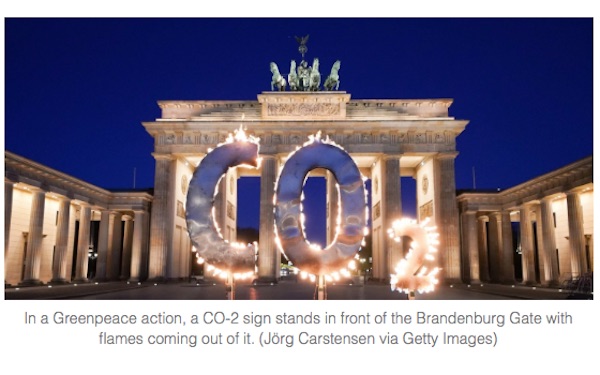conflict
The West’s Green Energy Delusions Empowered Putin

This article submitted by Michael Shellenberger
While we banned plastic straws, Russia drilled and doubled nuclear energy production.
How has Vladimir Putin—a man ruling a country with an economy smaller than that of Texas, with an average life expectancy 10 years lower than that of France—managed to launch an unprovoked full-scale assault on Ukraine?
There is a deep psychological, political and almost civilizational answer to that question: He wants Ukraine to be part of Russia more than the West wants it to be free. He is willing to risk tremendous loss of life and treasure to get it. There are serious limits to how much the U.S. and Europe are willing to do militarily. And Putin knows it.
Missing from that explanation, though, is a story about material reality and basic economics—two things that Putin seems to understand far better than his counterparts in the free world and especially in Europe.
Putin knows that Europe produces 3.6 million barrels of oil a day but uses 15 million barrels of oil a day. Putin knows that Europe produces 230 billion cubic meters of natural gas a year but uses 560 billion cubic meters. He knows that Europe uses 950 million tons of coal a year but produces half that.
The former KGB agent knows Russia produces 11 million barrels of oil per day but only uses 3.4 million. He knows Russia now produces over 700 billion cubic meters of gas a year but only uses around 400 billion. Russia mines 800 million tons of coal each year but uses 300.
That’s how Russia ends up supplying about 20 percent of Europe’s oil, 40 percent of its gas, and 20 percent of its coal.
The math is simple. A child could do it.
The reason Europe didn’t have a muscular deterrent threat to prevent Russian aggression—and in fact prevented the U.S. from getting allies to do more—is that it needs Putin’s oil and gas.
The question is why.
How is it possible that European countries, Germany especially, allowed themselves to become so dependent on an authoritarian country over the 30 years since the end of the Cold War?
Here’s how: These countries are in the grips of a delusional ideology that makes them incapable of understanding the hard realities of energy production. Green ideology insists we don’t need nuclear and that we don’t need fracking. It insists that it’s just a matter of will and money to switch to all-renewables—and fast. It insists that we need“degrowth” of the economy, and that we face looming human “extinction.” (I would know. I myself was once a true believer.)
John Kerry, the United States’ climate envoy, perfectly captured the myopia of this view when he said, in the days before the war, that the Russian invasion of Ukraine “could have a profound negative impact on the climate, obviously. You have a war, and obviously you’re going to have massive emissions consequences to the war. But equally importantly, you’re going to lose people’s focus.”
But it was the West’s focus on healing the planet with “soft energy” renewables, and moving away from natural gas and nuclear, that allowed Putin to gain a stranglehold over Europe’s energy supply.
As the West fell into a hypnotic trance about healing its relationship with nature, averting climate apocalypse and worshiping a teenager named Greta, Vladimir Putin made his moves.
While he expanded nuclear energy at home so Russia could export its precious oil and gas to Europe, Western governments spent their time and energy obsessing over “carbon footprints,” a term created by an advertising firm working for British Petroleum. They banned plastic straws because of a 9-year-old Canadian child’s science homework. They paid for hours of “climate anxiety” therapy.
While Putin expanded Russia’s oil production, expanded natural gas production, and then doubled nuclear energy production to allow more exports of its precious gas, Europe, led by Germany, shut down its nuclear power plants, closed gas fields, and refused to develop more through advanced methods like fracking.
The numbers tell the story best. In 2016, 30 percent of the natural gas consumed by the European Union came from Russia. In 2018, that figure jumped to 40 percent. By 2020, it was nearly 44 percent, and by early 2021, it was nearly 47 percent.
For all his fawning over Putin, Donald Trump, back in 2018, defied diplomatic protocol to call out Germany publicly for its dependence on Moscow. “Germany, as far as I’m concerned, is captive to Russia because it’s getting so much of its energy from Russia,” Trump said. This prompted Germany’s then-chancellor, Angela Merkel, who had been widely praised in polite circles for being the last serious leader in the West, to say that her country “can make our own policies and make our own decisions.”
The result has been the worst global energy crisis since 1973, driving prices for electricity and gasoline higher around the world. It is a crisis, fundamentally, of inadequate supply. But the scarcity is entirely manufactured.
Europeans—led by figures like Greta Thunberg and European Green Party leaders, and supported by Americans like John Kerry—believed that a healthy relationship with the Earth requires making energy scarce. By turning to renewables, they would show the world how to live without harming the planet. But this was a pipe dream. You can’t power a whole grid with solar and wind, because the sun and the wind are inconstant, and currently existing batteries aren’t even cheap enough to store large quantities of electricity overnight, much less across whole seasons.
In service to green ideology, they made the perfect the enemy of the good—and of Ukraine.
Take Germany.
Green campaigns have succeeded in destroying German energy independence—they call it Energiewende, or “energy turnaround”—by successfully selling policymakers on a peculiar version of environmentalism. It calls climate change a near-term apocalyptic threat to human survival while turning up its nose at the technologies that can help address climate change most and soonest: nuclear and natural gas.
At the turn of the millennium, Germany’s electricity was around 30 percent nuclear-powered. But Germany has been sacking its reliable, inexpensive nuclear plants. (Thunberg called nuclear power “extremely dangerous, expensive, and time-consuming” despite the UN’s International Panel on Climate Change deeming it necessary and every major scientific review deeming nuclear the safest way to make reliable power.)
By 2020, Germany had reduced its nuclear share from 30 percent to 11 percent. Then, on the last day of 2021, Germany shut down half of its remaining six nuclear reactors. The other three are slated for shutdown at the end of this year. (Compare this to nextdoor France, which fulfills 70 percent of its electricity needs with carbon-free nuclear plants.)
Germany has also spent lavishly on weather-dependent renewables—to the tune of $36 billion a year—mainly solar panels and industrial wind turbines. But those have their problems. Solar panels have to go somewhere, and a solar plant in Europe needs 400 to 800 times more land than natural gas or nuclear plants to make the same amount of power. Farmland has to be cut apart to host solar. And solar energy is getting cheaper these days mainly because Europe’s supply of solar panels is produced by slave labor in concentration camps as part of China’s genocide against Uighur Muslims.
The upshot here is that you can’t spend enough on climate initiatives to fix things if you ignore nuclear and gas. Between 2015 and 2025, Germany’s efforts to green its energy production will have cost $580 billion. Yet despite this enormous investment, German electricity still costs 50 percent more than nuclear-friendly France’s, and generating it produces eight times more carbon emissions per unit. Plus, Germany is getting over a third of its energy from Russia.
Germany has trapped itself. It could burn more coal and undermine its commitment to reducing carbon emissions. Or it could use more natural gas, which generates half the carbon emissions of coal, but at the cost of dependence on imported Russian gas. Berlin was faced with a choice between unleashing the wrath of Putin on neighboring countries or inviting the wrath of Greta Thunberg. They chose Putin.
Because of these policy choices, Vladimir Putin could turn off the gas flows to Germany, and quickly threaten Germans’ ability to cook or stay warm. He or his successor will hold this power for every foreseeable winter barring big changes. It’s as if you knew that hackers had stolen your banking details, but you won’t change your password.
This is why Germany successfully begged the incoming Biden administration not to oppose a contentious new gas pipeline from Russia called Nord Stream 2. This cut against the priorities of green-minded governance: On day one of Biden’s presidency, one of the new administration’’s first acts was to shut down the Keystone XL oil pipeline from Canada to the U.S. in service to climate ideology. But Russia’s pipeline was too important to get the same treatment given how dependent Germany is on Russian imports. (Once Russia invaded, Germany was finally dragged into nixing Nord Stream 2, for now.)
Naturally, when American sanctions on Russia’s biggest banks were finally announced in concert with European allies last week, they specificallyexempted energy products so Russia and Europe can keep doing that dirty business. A few voices called for what would really hit Russia where it hurts: cutting off energy imports. But what actually happened was that European energy utilities jumped to buy more contracts for the Russian oil and gas that flows through Ukraine. That’s because they have no other good options right now, after green activism’s attacks on nuclear and importing fracked gas from America. There’s no current plan for powering Europe that doesn’t involve buying from Putin.
We should take Russia’s invasion of Ukraine as a wake-up call. Standing up for Western civilization this time requires cheap, abundant, and reliable energy supplies produced at home or in allied nations. National security, economic growth, and sustainability requires greater reliance on nuclear and natural gas, and less on solar panels and wind turbines, which make electricity too expensive.
The first and most obvious thing that should be done is for President Biden to call on German Chancellor Scholz to restart the three nuclear reactors that Germany closed in December. A key step in the right direction came on Sunday when Vice-Chancellor Robert Habeck, the economy and climate minister, announced that Germany would at least consider stopping its phaseout of nuclear. If Germany turns these three on and cancels plans to turn off the three others, those six should produce enough electricity to replace 11 billion cubic meters of natural gas per year—an eighth of Germany’s current needs…
Subscribe to Michael Shellenberger to read the rest.
Become a paying subscriber of Michael Shellenberger to get access to this post and other subscriber-only content.
conflict
Columbia on Lockdown After pro-Palestinian Protesters Take Over Building, Hold Janitors Hostage

From Heartland Daily News
Columbia University locked down its campus Tuesday to everyone but essential personnel and students after anti-Israel protesters smashed windows and barricaded themselves inside Hamilton Hall early in the morning.
A staff member in the building at the time said he was temporarily taken hostage, The Columbia Spectator reports.
As of 9 a.m. Tuesday, the New York university even barred the media from campus “as a safety measure,” a news update states.
“Access to campus has been limited to students residing in residential buildings on campus and employees who provide essential services to campus buildings, labs, and residential student life,” according to the announcement.
The Spectator reports more:
The [lock down] comes six hours after around three dozen protesters occupied Hamilton Hall, pledging to remain inside the building until the University meets its stated demands, including divestment from Israel, financial transparency, and amnesty for students detained and suspended in the mass arrests on April 18.
Protesters sealed off the building minutes after entry, barricading the doors with wooden tables, chairs, and zip ties. Demonstrators outside moved the metal tables outside Hartley Hall to the front of the doors, securing them shut with ropes and zip ties.
A facilities worker said he was temporarily held hostage but allowed to leave about 10 minutes later, according to the student newspaper. Later, two other janitors said they also were temporarily held hostage, according to Fox News.
Columbia has fallen
Pro-Palestinian protesters have reportedly taken a building by force and barricaded themselves inpic.twitter.com/fhFbOmZVwY
— The College Fix (@CollegeFix) April 30, 2024
Several students also reported being assaulted by protesters trying to enter the building, according to an X video by freelance reporter Jessica Schwalb.
Student is assaulted by mob. @NYPDDaughtry Many students have called the police but where are you???
We are in danger. pic.twitter.com/ghZWuMgb6y
— Jessica Schwalb (@jessicaschwalb7) April 30, 2024
Pro-Palestinian protests have been going on for weeks at Columbia, with some demonstrators establishing a “Gaza Solidarity Encampment” on the lawn.
On Monday, university spokesperson Ben Chang said students began receiving suspension notices after ignoring repeated warnings to leave their encampment by 2 p.m. that day.
“Students who agreed to leave and sign a form committing to abide by University policies will be allowed to complete the semester,” Chang said in a campus update.
Some faculty members, many of them wearing masks, joined the protesters just ahead of the 2 p.m. deadline, locking arms to form a human chain around the encampment, according to videos on X.
Unbelievable. Columbia faculty lock arms to prevent police from clearing the encampment. Why do they still have jobs? pic.twitter.com/XrKlNCOx3q
— Ian Miles Cheong (@stillgray) April 29, 2024
As of Tuesday morning, the pro-Palestinian demonstrators continue to occupy the building. The Spectator reports New York Police Department officers have been at the scene since about 12:45 a.m. but have not entered the building.
conflict
Col. Douglas Macgregor torches Trump over support for bill funding wars in Ukraine and Israel

From LifeSiteNews
By Frank Wright
” He’s essentially throwing his principles overboard and his supporters under the bus.
If I were working for him right now and he were president I would have advised him under no circumstances to support the bill and instead focus our attention on the on the borders of the United States [and] restoring the rule of law. “
With another interview appearance, retired Colonel Douglas Macgregor has warned the United States is no longer in control of the wars it continues to fund, against overwhelming public opposition.
According to Macgregor and host Clayton Morris, a former Fox News anchor, “70 percent of the American people” now oppose sending money to fund wars present and future in Ukraine, Israel and Taiwan.
What is more, Macgregor says that given Donald Trump’s “catastrophically stupid” support of the $95 billion funding bill passed by Congress on April 20, if he were working for Trump now he “would have to resign.”
Speaking of Trump’s approval for the bill, Macgregor said, “What he did… is essentially align himself with the money pigs in Washington who were interested in everything other than the American people.”
Macgregor’s verdict on Trump was damning:
He’s essentially throwing his principles overboard and his supporters under the bus.
If I were working for him right now and he were president I would have advised him under no circumstances to support the bill and instead focus our attention on the on the borders of the United States [and] restoring the rule of law.
So why did Trump go ahead and endorse billions more for two wars which are widely acknowledged as having been disastrous – if not genocidal – failures?
“I think Mr. Trump wants desperately to be president,” explained Macgregor. “So, he is turning to everyone and anyone who has money willing to support him and will promise to do so – whatever they’re asking.”
The retired colonel is the CEO of Our Country, Our Choice, an organization which appeals to Americans “to come together to save America.” It’s motto is “Truth sets you free,” echoing the Christian roots of the American dream which is, according to Macgregor, verging on becoming a nightmare.
Macgregor is not afraid to speak uncomfortable truths, whether about his former president, or about the perilous state of a world on the brink of war. He considers Trump’s decision “outrageous “ and says Trump has “made a bad mistake… I think it will haunt him.”
Instead of supporting the funding bill, Macgregor says Trump “should have stood with the 21 members” of Congress who opposed it because, “quite frankly, most of America stands with those 21 members.”
Macgregor is aware that this is about political power, not the interests of the people – whether they be in the U.S. or in Ukraine. He is practically alone in noting that throughout the proxy war, the Ukrainian people seldom get a mention.
“No one expresses any interest in what’s happened to the Ukrainian people,” he said, before citing the horrendous toll of deaths and injuries which has devastated the Ukrainian populace.
“Ukrainians are exhausted. They’re tired of this war. They’ve lost now, we think, 600,000 dead and another million or two wounded.”
Added to these sobering figures is the fact that much of the surviving population has fled.
“Millions have left. The country is destroyed. It desperately needs peace.”
As the Washington Post claimed last December, up to “90 percent” of the money given in “aid” stays in the U.S. anyway. On April 21, the U.K.’s Financial Times concluded that the aid package “would not stop Russia.” On April 23, it reported that Ukraine now “pressures draft-age men abroad to join the war effort,” following a Politico report of last month titled “Draft-dodging plagues Ukraine as Kyiv faces acute soldier shortage.” The report cites the BBC in claiming up to “650,000 military aged men have fled the country” in the past two years, despite a law forbidding them to do so.
Former humanitarian volunteer and Catholic convert Ryan Miller told LifeSiteNews last month of how human traffickers operate freely on the Ukrainian border, preying on women and children separated by this law from their husbands and fathers.
This news portrays a grim reality behind the Ukraine flag-waving seen on the United States House floor. It is a narrative of ugly truths supporting Macgregor’s assessment of a war he has consistently claimed could never have been won. Against the notion that America must “stop Putin,” he said:
We’ve never had any option other than to accept his [Putin’s] victory because, as we said from the very beginning, Ukraine had no more chance against Russia than Mexico would have against us in the United States.
The second war funded in this package has, according to Israeli media, already ended in “total defeat.”
Israeli newspaper Haaretz published this story on April 11, “Saying What Can’t Be Said: Israel Has Been Defeated – a Total Defeat”
The story by Chaim Levinson displayed a remarkable level of candor.
“The war’s aims won’t be achieved, the hostages won’t be returned through military pressure, security won’t be restored and Israel’s international ostracism won’t end.”
Macgregor shares this assessment, which he couples with a warning that “Biden is not in control” of events in the Middle East, and neither is the U.S. “Mr. Netanyahu is in control. And he cannot back down. If he does not escalate, he is finished.”
Macgregor warns that the “world has turned against Israel, we are increasingly isolated, but we are not in control. Mr. Netanyahu owns us. What do we do?”
Macgregor stressed that U.S. backing for Netanyahu is the result of his having more influence in the U.S. government than the president. This means, in effect, that the U.S. is funding a man whose only option is to escalate to war with Iran.
“Mr. Netanyahu is in a difficult position,” explains Macgregor, “we can’t help him. All we can do is tell him to back down. He can’t back down.”
“Netanyahu has to escalate or he’s finished. So I don’t think we’ve seen the last of the Israeli-Iranian confrontation.”
Warning that Netanyahu is likely going to “kill women, children, and men with no connection to Hamas in Gaza’s Rafah area,” he foresees a real potential for the outbreak of a major regional war involving the U.S.
I don’t think we’ve even seen the beginnings of what could happen in the region because, if anything, we’re seeing more and more and more solidarity across national lines inside the Muslim world.
As this develops, Macgregor claims even the Western military alliance is leaderless:
NATO is essentially a battleship with no one on the bridge and engines that don’t power the ship anymore. It’s adrift.
He says in previous years the “stupid comments” of French President Emmanuel Macron to threaten to send French troops to Ukraine would have been unimaginable. Responding to claims that French and American soldiers are now on the ground in Odessa in Ukraine, he replied, “A Russian this morning contacted me… and said that he sees no French or American troops in Odessa.”
His relief at this news was tempered by a stern reminder that such an action would lead to a U.S. war with Russia, which has the largest nuclear arsenal on earth.
I sincerely hope that that condition does not change. If it does, then I think the Russians will accelerate all of their movements and we will find ourselves at war with Russia unnecessarily.
He asks, “For what particular purpose?”
The direct funding of two major flashpoints for a global war left the host, Clayton Morris, unable to explain Trump’s support of the move.
“This rises to the level of coming out and supporting the COVID vaccines,” he said, speaking of Trump’s recent praise for the mRNA injections.
“I think there was a lot of MAGA Republicans who said ‘Wait a second – did Trump just praise COVID vacc [sic] – wait did I hear that right?’”
The news of Trump’s backing for the war funding has left Morris equally baffled, as he quoted Trump’s recent comments:
In the same week [Trump] says we’ve spent 7 to 9 trillion dollars on boondoggle wars in the Middle East… where we have blood on our hands… we’ve got nothing but blood and misery, we should have never supported those Wars.
He added, “and then four days later… supporting speaker Johnson supporting all of this money to Ukraine and Israel and Taiwan? I just can’t wrap my head around it.”
For Colonel Macgregor, this is a decision which will follow Trump long into the future.
“So we have to be realistic about this whole business. He’s let a lot of people down. I think it will come back to haunt him.”
The dangerous business of funding death no longer haunts only the politicians – like Trump and Netanyahu – who rely on it to secure their power. If Macgregor is right, the world may be engulfed in a nuclear war as a result of these bargains with the devil.
-

 Uncategorized1 day ago
Uncategorized1 day agoMaking Alberta a geothermal energy leader
-

 COVID-192 days ago
COVID-192 days agoPeckford: Hallelujah! Supreme Court of Canada to hear Newfoundland and Labrador charter case
-

 Alberta1 day ago
Alberta1 day agoThree Calgary massage parlours linked to human trafficking investigation
-

 Alberta1 day ago
Alberta1 day agoAlberta’s vision for passenger rail
-

 Alberta2 days ago
Alberta2 days agoCanada’s postal service refuses to help with Trudeau’s gun ban buyback program: report
-

 COVID-191 day ago
COVID-191 day agoStates move to oppose WHO’s ‘pandemic treaty,’ assert states’ rights
-

 Business1 day ago
Business1 day agoParliamentary Budget Officer forecasts bigger deficits for years to come
-

 Addictions1 day ago
Addictions1 day agoMust Watch: Addiction worker estimates 90% of “safer supply” drugs resold on black market








